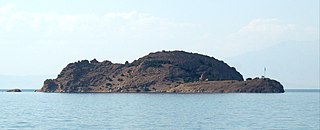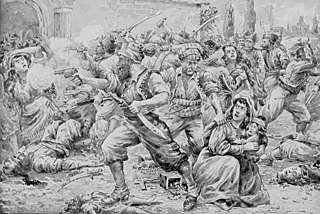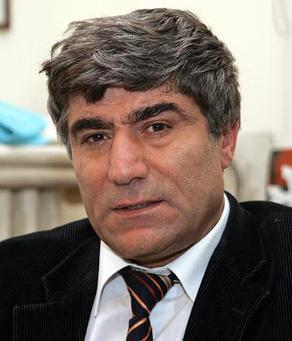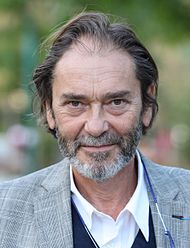
Akdamar Island, also known as Aghtamar or Akhtamar, is the second largest of the four main islands in Lake Van, in eastern Turkey. About 0.7 km2 in size, it is situated approximately 3 km from the shoreline. At the western end of the island, a hard, grey, limestone cliff rises 80 m above the lake's level. The island declines to the east to a level site where a spring provides ample water.

Cem Özdemir is a German politician who currently serves as Federal Minister of Food and Agriculture since 2021. He is a member of the Alliance 90/The Greens party.

Cengiz Çandar is a Turkish politician, journalist, senior columnist, and a Middle East expert. He is the author of Turkey's Neo-Ottomanist Moment - A Eurasianist Odyssey (2021); Turkey's Mission Impossible: War and Peace with the Kurds (2020) and Mezopotamya Ekspresi- Bir Tarih Yolculugu (2012), which has been translated into various languages, including Kurdish (Sorani) and Arabic.
Armenians in Turkey, one of the indigenous peoples of Turkey, have an estimated population of 40,000 to 50,000 today, down from a population of over 2 million Armenians between the years 1914 and 1921. Today, the overwhelming majority of Turkish Armenians are concentrated in Istanbul. They support their own newspapers, churches and schools, and the majority belong to the Armenian Apostolic faith and a minority of Armenians in Turkey belong to the Armenian Catholic Church or to the Armenian Evangelical Church. They are not considered part of the Armenian diaspora, since they have been living in their historical homeland for more than four thousand years.

Anti-Armenian sentiment, also known as anti-Armenianism and Armenophobia, is a diverse spectrum of negative feelings, dislikes, fears, aversion, racism, derision and/or prejudice towards Armenians, Armenia, and Armenian culture.

Diplomatic relations between Armenia and Turkey are officially non-existent and have historically been hostile. Whilst Turkey recognised Armenia shortly after the latter proclaimed independence in September 1991, it has refused to establish diplomatic relations. In 1993, Turkey reacted to the war in Nagorno-Karabakh by closing its border with Armenia out of support for Azerbaijan, which remain closed to this day despite sporadic negotiations regarding possible opening.

Hrant Dink was a Turkish-Armenian intellectual, editor-in-chief of Agos, journalist, and columnist. As editor-in-chief of the bilingual Turkish-Armenian newspaper Agos, Dink was a prominent member of the Armenian minority in Turkey best known for advocating Turkish–Armenian reconciliation and human and minority rights in Turkey. He was often critical of both Turkey's denial of the Armenian genocide and of the Armenian diaspora's campaign for its international recognition. Dink was prosecuted three times for denigrating Turkishness, while receiving numerous death threats from Turkish nationalists.

Armenian genocide recognition is the formal acceptance of the fact that the Ottoman Empire's systematic massacres and forced deportation of Armenians from 1915 to 1923, both during and after the First World War, constituted genocide.

Russia–Turkey relations are the bilateral relations between Russia and Turkey and their antecedent states. Relations between the two are rather cyclical. From the late 16th until the early 20th centuries, relations between the Ottoman and Russian empires were normally adverse and hostile and the two powers were engaged in numerous Russo-Turkish wars, including one of the longest wars in modern history. Russia attempted to extend its influence in the Balkans and gain control of the Bosphorus at the expense of the weakening Ottoman Empire. As a result, the diplomatic history between the two powers was extremely bitter and acrimonious up to World War I. However, in the early 1920s, as a result of the Bolshevik Russian government's assistance to Turkish revolutionaries during the Turkish War of Independence, the governments' relations warmed. Relations again turned sour at the end of WWII as the Soviet government laid territorial claims and demanded other concessions from Turkey. Turkey joined NATO in 1952 and placed itself within the Western alliance against the Warsaw Pact during the Cold War, when relations between the two countries were at their lowest level. Relations began to improve the following year, when the Soviet Union renounced its territorial claims after the death of Stalin.
Heath Ward Lowry is the Atatürk Professor of Ottoman and Modern Turkish Studies emeritus at Princeton University and Bahçeşehir University. He is an author of books about the history of the Ottoman Empire and Modern Turkey.
Jean-Claude Kebabdjian is an Armenian-French publisher, journalist and author. Since the 1970s he raised awareness of Armenian memory and Armenian culture within the French society and within Europe.

Volkan Bozkır is a Turkish diplomat and politician who served as the President of the United Nations General Assembly from 2020 to 2021. He served as Minister for European Union Affairs from November 2015 to May 2016 and previously held the same office from August 2014 to August 2015. He concurrently served as the Chief Negotiator for Turkish Accession to the European Union during the same time.

The International Centre for Migration Policy Development (ICMPD) is an international organisation which makes policy recommendations on migration-related issues to governments and intergovernmental agencies. Founded by Austria and Switzerland as a think tank in 1993, and headquartered in Vienna. As of May 2023 ICMPD was composed of 20 member states.
Hidden Armenians or crypto-Armenians is an umbrella term to describe Turkish citizens hiding their full or partial Armenian ancestry from the larger Turkish society. They are mostly descendants of Ottoman Armenians who, at least outwardly, were Islamized "under the threat of physical extermination" during the Armenian genocide.

Zohrab Hrachiki Mnatsakanyan is an Armenian diplomat. Mnatsakanyan previously served as Minister of Foreign Affairs and Armenia's Permanent Representative to the United Nations.
"I Apologize" is an online campaign launched in December 2008 in Turkey by numerous journalists, politicians, and professors, calling for a collective apology for the Armenian genocide, which the campaign calls "the Great Catastrophe that Ottoman Armenians were subjected to in 1915." The campaign was launched by Prof. Ahmet İnsel, politician Baskın Oran, Dr. Cengiz Aktar, and journalist Ali Bayramoğlu. The campaign emphasizes regret on behalf of Turkey that Armenian requests for recognition of the 1915 genocide have been actively suppressed within Turkey. The campaign was signed by 5,000 people within the first 24 hours, and had collected over 30,000 signatories by January 2009. The campaign created widespread outrage in Turkish society.

During the Armenian genocide, which occurred in the Ottoman Empire, led at the time by the Young Turks, the Turkish armed forces, militias, and members of the public engaged in a systematic campaign of genocidal rape against female Armenians and children of both sexes. Before the genocide had begun, one method used to intimidate the Armenian population was sexual humiliation. Women and young girls were not only subjected to rape, but also forced marriage, torture, forced prostitution, slavery and sexual mutilation.

Baskın Oran is a Turkish academic, politician and human rights activist. Currently, he is a teacher in Faculty of Political Science, Ankara University.

The relationship between the Armenian genocide and the Holocaust has been discussed by scholars. Although there is some disagreement, the majority of scholars believe that there is a direct causal relationship between the two genocides.
Prior to joining the Allied Powers late in the war, Turkey was officially neutral in World War II. Despite its neutrality, Turkey maintained strong diplomatic relations with Nazi Germany during the period of the Holocaust. During the war, Turkey denaturalized 3,000 to 5,000 Jews living abroad; between 2,200 and 2,500 Turkish Jews were deported to extermination camps such as Auschwitz and Sobibor; and several hundred confined in Nazi concentration camps. When Nazi Germany encouraged neutral countries to repatriate their Jewish diaspora, Turkish diplomats received instructions to avoid repatriating Jews even if they could prove their Turkish nationality. Turkey was also the only neutral country to implement anti-Jewish laws during the war. Between 1940 and 1944, around 13,000 Jews passed through Turkey from Europe to Mandatory Palestine. According to the research of historian Rıfat Bali, more Turkish Jews suffered as a result of discriminatory policies during the war than were saved by Turkey. Since the war, Turkey and parts of the Turkish Jewish community have promoted exaggerated claims of rescuing Jews, using this myth to promote Armenian genocide denial.














